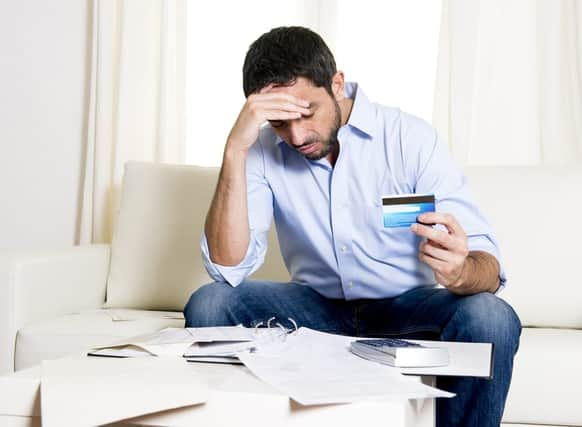Brits living 'beyond their means' rack up millions in credit card and overdraft payments


Millions of Brits feel they are ‘living beyond their means’ and only 'get by' on credit, a study has found.
Researchers discovered a large percentage of the nation fall back on credit cards and overdrafts when wages fail to last until the end of the month.
Advertisement
Hide AdAdvertisement
Hide AdAlmost half of 2,000 people surveyed have a credit card to deal with excess spending, 10 per cent have an overdraft and 20 per cent have both as provisions for when times get tough.
Credit card holders who took part in the research admitted racking up around £269.17 per month on their card in an attempt to get by.
Of those with an overdraft, 17 per cent often find themselves dipping into the red as pay-day approaches.
James Buttrick, from Vantage Leasing, who commissioned the study, said: “It’s a sad fact that most of us are familiar with the feeling of purse strings tightening as pay day fades into a distant memory.
Advertisement
Hide AdAdvertisement
Hide Ad“When funds are running dry, most Brits have a fall-back set up which they can plunder as needed, but this shouldn’t be seen as a long-term solution to cash flow problems.
“Many of us could take a look at our lives and endeavour to make smarter money choices going forward to keep our spending habits in check, curbing spontaneous, big-ticket purchases for more sensible payment plans."
Pay-day spending
Of those going into their overdraft or using their credit card, 36 per cent blame overzealous spending at the beginning of the month, straight after pay day, for their cash drought in later weeks.
And a disorganised 53 per cent have been caught unawares by a bill or payment which has left their remaining funds decimated.
Advertisement
Hide AdAdvertisement
Hide AdMost admit the top regrettable purchase that eats into their budget is the spending on clothes, with one in four splurging on and outfit when wages land in their account.
Fast food, meals out and nights on the town with friends are among the things we regret blowing money on from time to time.
Thirty seven per cent identified a ‘financial blind-spot’ in their spending which eats away at their earnings each month.
Of these, 57 per cent named food as their financial weakness and 41 per cent thought they were too liberal with treating themselves.
Non-essential items
Advertisement
Hide AdAdvertisement
Hide AdThe average Brit spends £101 a month on non-essential products and services they could potentially put into their savings.
In an effort to curb spending, three in five have made adjustments to their daily expenditure.
Of these, 48 per cent have started taking packed lunches to work and 35 per cent have cancelled non-essential direct debits.
One in seven have even sold a ‘big-ticket’ item like their car in order to give their account an emergency cash injection.
Advertisement
Hide AdAdvertisement
Hide AdThirteen per cent feel they are terrible at dealing with money, though 35 per cent said they are great at navigating their way around their finances.
James Buttrick added: “When pay day arrives and our pockets are deepest, this is when we are at the biggest risk of irresponsible spending.
“Whether it’s some new threads you’ve had an eye on all month, a big night out to celebrate or a bigger ticket item like a car or home furnishing, it is worth taking a moment to take stock as impulse purchases could mean your riches are short-lived."